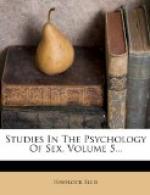There is another factor which enters into this question and renders the definition of a physical sexual type less precise than it would otherwise be. The sexual instinct is common to all persons, and while it seems probable that there is a type of person in whom sexual energies are predominant, it would also appear that the people who otherwise show a very high level of energy in life usually exhibit a more than average degree of energy in matters of love. The predominantly sexual type, as we have seen, tends to be associated with a high degree of pigmentation; the person specially apt for detumescence inclines to belong to the dark rather than to the purely fair group of the population. On the other hand, the active, energetic, practical man, the man who is most apt for the achievement of success in life, tends to belong to the fair rather than to the dark type.[168] Thus we have a certain conflict of tendencies, and it becomes possible to assert that while persons with pronounced aptitude for sexual detumescence tend to be dark, persons whose pronounced energy in sexual matters tends to ensure success are most likely to be fair.
The tendency of the fair energetic type, the type of the northern European man, to sexuality may be connected with the fact that the violent and criminal man who commits sexual crimes tends to be fair even amid a dark population. Criminals on the whole would appear to tend to be dark rather than fair; but Marro found in Italy that the group of sexual offenders differed from all other groups of criminals in that their hair was predominantly fair. (Caratteri del Delinquenti, p. 374.) Ottolenghi, in the same way, in examining 100 sexual offenders, found that they showed 17 per cent., of fair hair, though criminals generally (on a basis of nearly 2000) showed only 6 per cent., and normal persons (nearly 1000) 9 per cent. Similarly while the normal persons showed only 20 per cent. of blue eyes and criminals generally 36 per cent., the sexual offenders showed 50 per cent. of blue eyes. (Ottolenghi, Archivio di Psichiatria, fasc.




